Challenges and Issues Faced by Early Childhood Practitioners with Digital Tools
Added on 2023-05-28
35 Pages10141 Words421 Views
Researching Professional Practice in
Early Years
Early Years

Abstract
Digital tools are those electronic means which are based on the technological aspects and
used for many purposes such as education, businesses, military, government etc. The current
education system is completely depending on technological equipment such as computers,
laptops, tablet, mobile phones, interactive smart boards etc. In the current study, several
limitations and problems have been identified that occurs at the time of implementation of digital
tools in the Kindergarten. In this report, it has been found that early educators face issues such
as lack of knowledge of digital tools, lack of training etc. At the end, it has been recommended to
use collaborative learning and use of broadcasting techniques to deal with challenges digital
tools.
Digital tools are those electronic means which are based on the technological aspects and
used for many purposes such as education, businesses, military, government etc. The current
education system is completely depending on technological equipment such as computers,
laptops, tablet, mobile phones, interactive smart boards etc. In the current study, several
limitations and problems have been identified that occurs at the time of implementation of digital
tools in the Kindergarten. In this report, it has been found that early educators face issues such
as lack of knowledge of digital tools, lack of training etc. At the end, it has been recommended to
use collaborative learning and use of broadcasting techniques to deal with challenges digital
tools.

Table of Contents
1.0 INTRODUCTION................................................................................................................1
1.1 Background............................................................................................................................1
1.2 Research question..................................................................................................................1
1.3 Significance of the study.......................................................................................................1
1.4 Overview of the report...........................................................................................................2
2.0 LITERATURE REVIEW..........................................................................................................2
2.1 Evaluating limitations and issues of early childhood practitioners face with digital tools. . .2
2.2 Analyzing the perception of early practitioners in implementing digital tools in teaching
and learning in the classroom......................................................................................................4
2.3 Identifying how the teachers use digital tools in teaching and learning in the classroom.....5
3.0 METHODOLOGY AND ETHICS............................................................................................6
3.1 Introduction............................................................................................................................6
3.2 Type of study.........................................................................................................................6
3.3 Research approach.................................................................................................................6
3.4 Research philosophy..............................................................................................................7
3.5 Data collection.......................................................................................................................7
3.5.1 Participants.........................................................................................................................7
3.5.2 Settings...............................................................................................................................8
3.6 Ethical consideration.............................................................................................................8
3.8 Findings.................................................................................................................................9
4.0 FINDINGS AND ANALYSIS..................................................................................................9
5.0 CONCLUSION........................................................................................................................18
REFERENCES..............................................................................................................................20
APPENDIX....................................................................................................................................25
1.0 INTRODUCTION................................................................................................................1
1.1 Background............................................................................................................................1
1.2 Research question..................................................................................................................1
1.3 Significance of the study.......................................................................................................1
1.4 Overview of the report...........................................................................................................2
2.0 LITERATURE REVIEW..........................................................................................................2
2.1 Evaluating limitations and issues of early childhood practitioners face with digital tools. . .2
2.2 Analyzing the perception of early practitioners in implementing digital tools in teaching
and learning in the classroom......................................................................................................4
2.3 Identifying how the teachers use digital tools in teaching and learning in the classroom.....5
3.0 METHODOLOGY AND ETHICS............................................................................................6
3.1 Introduction............................................................................................................................6
3.2 Type of study.........................................................................................................................6
3.3 Research approach.................................................................................................................6
3.4 Research philosophy..............................................................................................................7
3.5 Data collection.......................................................................................................................7
3.5.1 Participants.........................................................................................................................7
3.5.2 Settings...............................................................................................................................8
3.6 Ethical consideration.............................................................................................................8
3.8 Findings.................................................................................................................................9
4.0 FINDINGS AND ANALYSIS..................................................................................................9
5.0 CONCLUSION........................................................................................................................18
REFERENCES..............................................................................................................................20
APPENDIX....................................................................................................................................25
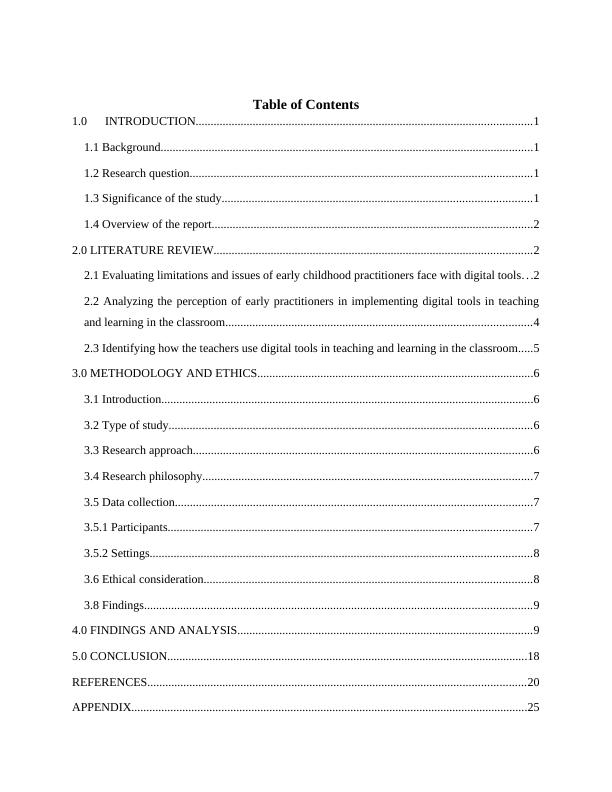

1.0 INTRODUCTION
1.1 Background
In the early years, teaching practitioners basically used the books and available printed
material to teach the students. Early educators are not aware of the technology and e-learning
sources for the effective teaching of the students. In this context, the involvement of digital tools
has been recognized as an important aspect of education to improve the education level of
current edge students. Additionally, sustainable society is maintained by the experienced and
knowledgeable practitioners in the field education (Sheridan et al., 2009; Van Helden, Aardema,
ter Bogt and Groot, 2010). Chidren education is developed by implementing digital tools in the
classroom activities because it provides a variety of opportunities for students to apply creativity
in classroom projects. However, the early practitioners face the issues in the operation of digital
tools on regular basis due to lack of awareness (Bjørgen and Svendsen, 2015; Kirschner,
Buckingham-Shum and Carr, 2012). At this juncture, early educators prefer to take training from
the experts to successfully operate the digital tools in the classroom which affects the
involvement of the students in the classroom. Now, the scenario of education has been changed
because students, families, teachers are more associated with technology to get huge knowledge
and improve the efficiency of the child. By considering this, early educators are focusing on the
implementation of computers, laptops and other digital tools in the lessons of the classroom.
1.2 Research question
What are the challenges and issues early childhood practitioners face with digital tools?
Sub questions
What are the perception in implementing digital tools in teaching and learning in
classroom?
How do teachers use digital tools in teaching and learning in the classroom?
1.3 Significance of the study
This research emphasizes on limitations and problems which are faced by early educators
in the implementation of digital tools in the classroom activities. The use of technology reduces
the burden of the students regarding the study material; however, it has many drawbacks because
1
1.1 Background
In the early years, teaching practitioners basically used the books and available printed
material to teach the students. Early educators are not aware of the technology and e-learning
sources for the effective teaching of the students. In this context, the involvement of digital tools
has been recognized as an important aspect of education to improve the education level of
current edge students. Additionally, sustainable society is maintained by the experienced and
knowledgeable practitioners in the field education (Sheridan et al., 2009; Van Helden, Aardema,
ter Bogt and Groot, 2010). Chidren education is developed by implementing digital tools in the
classroom activities because it provides a variety of opportunities for students to apply creativity
in classroom projects. However, the early practitioners face the issues in the operation of digital
tools on regular basis due to lack of awareness (Bjørgen and Svendsen, 2015; Kirschner,
Buckingham-Shum and Carr, 2012). At this juncture, early educators prefer to take training from
the experts to successfully operate the digital tools in the classroom which affects the
involvement of the students in the classroom. Now, the scenario of education has been changed
because students, families, teachers are more associated with technology to get huge knowledge
and improve the efficiency of the child. By considering this, early educators are focusing on the
implementation of computers, laptops and other digital tools in the lessons of the classroom.
1.2 Research question
What are the challenges and issues early childhood practitioners face with digital tools?
Sub questions
What are the perception in implementing digital tools in teaching and learning in
classroom?
How do teachers use digital tools in teaching and learning in the classroom?
1.3 Significance of the study
This research emphasizes on limitations and problems which are faced by early educators
in the implementation of digital tools in the classroom activities. The use of technology reduces
the burden of the students regarding the study material; however, it has many drawbacks because
1
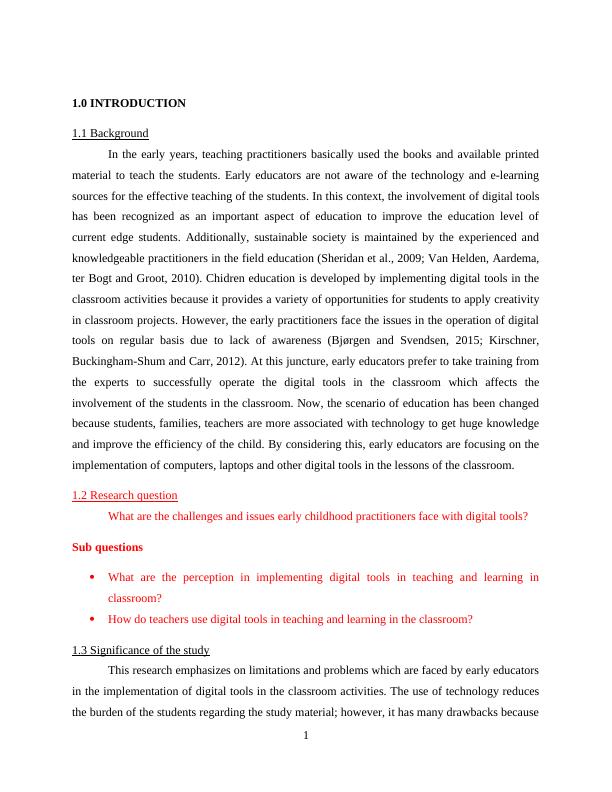
youngsters getting addicted to the technologies. Additionally, addiction of e-tools reduces the
immunity power of the child and consume the more time which can be used in the further
activities of the life such as games, extra curriculum activities, spend time with family etc.
(Gananathan, 2011; Heider and Jalongo, 2014). However, the schools are using digital tools in
the classroom activities to improve the students learning because it helps to improve the
efficiency of the child and to develop them as an expert in all fields. Therefore, the current study
will shed light on the issues of early educators at the time of operation of the digital tools in the
classroom learning.
1.4 Overview of the report
The current report is based on the limitations and issues faced by early practitioners in the
use of digital tools in the classroom. The teaching staff deals with the problems that occur at the
time of digitization; nonetheless, early practitioners are emphasizing on the development of
deeper understanding regarding educational principles and implementing developmental tools to
improve the effectiveness of the pedagogy (Lieberman, Bates and So, 2009; Waycott et al.,
2010). In this regard, in the current study, the perception of early practitioners has been analyzed
with respect to the implementation of digital tools in the classroom activities. Moreover, it has
been analyzed that children education demand the use of digital tools in the learning because it
enhances the interest as well as engagement in the activities of the class. Apart from this, the
process of implementation of digital tools has also been assessed of early practitioners to use in
the childcare. For this purpose, a literature review has been done to gather the information
regarding implementation of digital tools and perception of early practitioners of Kindergarten.
Further, appropriate methodologies have been applied for the study to derive the effective
findings. At the end, an effective data analysis has been done to get the optimum outcomes of the
study.
2.0 LITERATURE REVIEW
2.1 Evaluating limitations and issues of early childhood practitioners face with digital tools
Lack of knowledge- According to several studies, students of the current era are using
different types of digital tools such as mobile phones, i-pad, laptops for the completion of
study and projects (Murphy, Rodríguez‐Manzanares and Barbour, 2011; Bryer and
Zavattaro, 2011; McPake, Plowman and Stephen, 2013). However, early childhood
2
immunity power of the child and consume the more time which can be used in the further
activities of the life such as games, extra curriculum activities, spend time with family etc.
(Gananathan, 2011; Heider and Jalongo, 2014). However, the schools are using digital tools in
the classroom activities to improve the students learning because it helps to improve the
efficiency of the child and to develop them as an expert in all fields. Therefore, the current study
will shed light on the issues of early educators at the time of operation of the digital tools in the
classroom learning.
1.4 Overview of the report
The current report is based on the limitations and issues faced by early practitioners in the
use of digital tools in the classroom. The teaching staff deals with the problems that occur at the
time of digitization; nonetheless, early practitioners are emphasizing on the development of
deeper understanding regarding educational principles and implementing developmental tools to
improve the effectiveness of the pedagogy (Lieberman, Bates and So, 2009; Waycott et al.,
2010). In this regard, in the current study, the perception of early practitioners has been analyzed
with respect to the implementation of digital tools in the classroom activities. Moreover, it has
been analyzed that children education demand the use of digital tools in the learning because it
enhances the interest as well as engagement in the activities of the class. Apart from this, the
process of implementation of digital tools has also been assessed of early practitioners to use in
the childcare. For this purpose, a literature review has been done to gather the information
regarding implementation of digital tools and perception of early practitioners of Kindergarten.
Further, appropriate methodologies have been applied for the study to derive the effective
findings. At the end, an effective data analysis has been done to get the optimum outcomes of the
study.
2.0 LITERATURE REVIEW
2.1 Evaluating limitations and issues of early childhood practitioners face with digital tools
Lack of knowledge- According to several studies, students of the current era are using
different types of digital tools such as mobile phones, i-pad, laptops for the completion of
study and projects (Murphy, Rodríguez‐Manzanares and Barbour, 2011; Bryer and
Zavattaro, 2011; McPake, Plowman and Stephen, 2013). However, early childhood
2
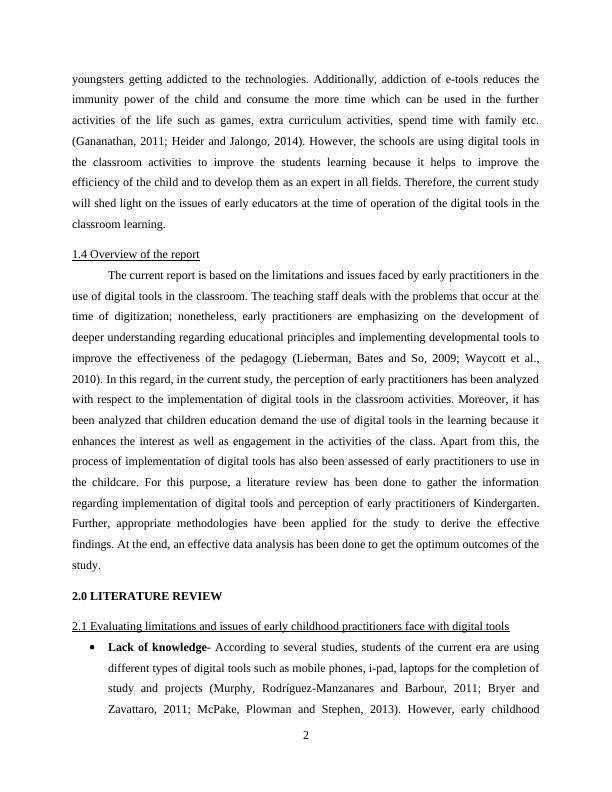
practitioners are facing the problem with the operation of digital tools as well as dealing
with the issues in checking of the submitted projects of students (McPake, Plowman and
Stephen, 2013; Royle and Laing, 2014). Similarly, Harris et al. (2018) asserted that lack
of knowledge is one of the limitations of early practitioners because early childhood
teachers are unable to access the e-portfolios at home or in or outside the schools.
Additionally, it minimizes the opportunities for early practitioners to cope up with digital
tools and unable to support the child in projects which are based on e-tools. On a
contrary, Beetham and Sharpe (2013) argued that early teachers are getting training from
technology experts to operate the digital tools and to interact with young students for the
delivery of quality education and broad knowledge to the students. On the other hand,
Ghavifekr et al. (2016, p.38) mentioned that early practitioners are dealing with the issues
of limited technical support as well as lack of teacher’s capabilities in the context of use
of digital tools. Moreover, early childhood practitioners have limited or no knowledge
regarding the use of technical equipment and do not have adequate competencies for the
operation of digital tools in the education of the child. Therefore, it indicates that early
childhood practitioners deal with many issues in the operation of digital tools due to lack
of knowledge. Further, many obstacles arise due to lack of knowledge as well as do not
have required competencies for the use of technology tools in the education sector.
Lack of training- Han (2003, p.49) stated that involvement of computer hardware in the
education system helps in the learning of the child more effectively; however, early
practitioners do not have sufficient experience to integrate the computer embedded
technologies in a minimum time period of class. However, Royle and Laing (2014)
asserted that appropriate training regarding the application of computer is helpful for the
early educators and increase theier readiness in early practitioners to use the advanced
technologies in the classroom. Similarly, McPake, Plowman and Stephen (2013)
mentioned that an effective curriculum as per the culture of the school is suitable to
improve the learning with the use of digital tools. It helps to apply the new computer
technology in Kindergarten because every childhood schools have a different culture and
environment to teach the students. In this context, to deal with the issues related to
culture and environment, management of schools can provide the on-site training for
early educators for the effectiveness of the results (Collis and Moonen, 2012; Säljö,
3
with the issues in checking of the submitted projects of students (McPake, Plowman and
Stephen, 2013; Royle and Laing, 2014). Similarly, Harris et al. (2018) asserted that lack
of knowledge is one of the limitations of early practitioners because early childhood
teachers are unable to access the e-portfolios at home or in or outside the schools.
Additionally, it minimizes the opportunities for early practitioners to cope up with digital
tools and unable to support the child in projects which are based on e-tools. On a
contrary, Beetham and Sharpe (2013) argued that early teachers are getting training from
technology experts to operate the digital tools and to interact with young students for the
delivery of quality education and broad knowledge to the students. On the other hand,
Ghavifekr et al. (2016, p.38) mentioned that early practitioners are dealing with the issues
of limited technical support as well as lack of teacher’s capabilities in the context of use
of digital tools. Moreover, early childhood practitioners have limited or no knowledge
regarding the use of technical equipment and do not have adequate competencies for the
operation of digital tools in the education of the child. Therefore, it indicates that early
childhood practitioners deal with many issues in the operation of digital tools due to lack
of knowledge. Further, many obstacles arise due to lack of knowledge as well as do not
have required competencies for the use of technology tools in the education sector.
Lack of training- Han (2003, p.49) stated that involvement of computer hardware in the
education system helps in the learning of the child more effectively; however, early
practitioners do not have sufficient experience to integrate the computer embedded
technologies in a minimum time period of class. However, Royle and Laing (2014)
asserted that appropriate training regarding the application of computer is helpful for the
early educators and increase theier readiness in early practitioners to use the advanced
technologies in the classroom. Similarly, McPake, Plowman and Stephen (2013)
mentioned that an effective curriculum as per the culture of the school is suitable to
improve the learning with the use of digital tools. It helps to apply the new computer
technology in Kindergarten because every childhood schools have a different culture and
environment to teach the students. In this context, to deal with the issues related to
culture and environment, management of schools can provide the on-site training for
early educators for the effectiveness of the results (Collis and Moonen, 2012; Säljö,
3
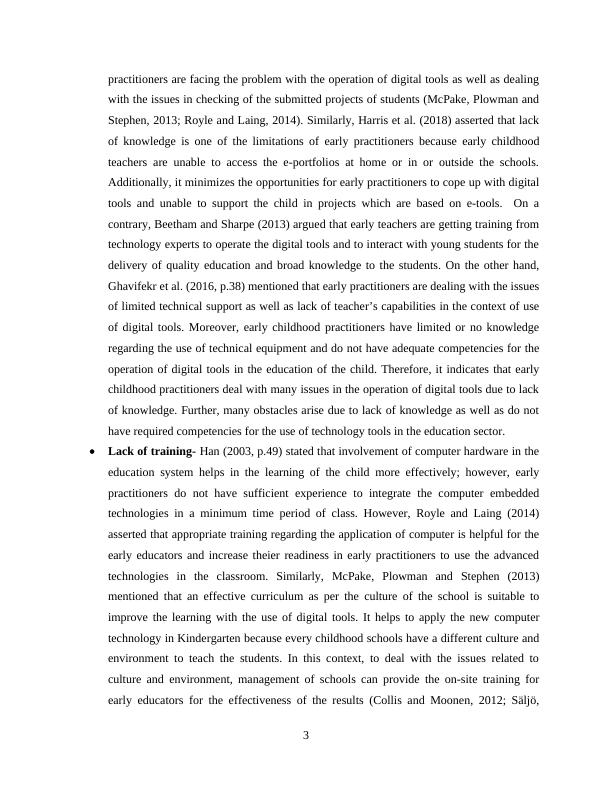
2010). Thus, it reveals that to reduce the effects of lack of experience regarding use of
computer technology in Kindergarten’s early practitioners can be improved through
rendering on-site training. Further, an effective cultural environment can also be
appropriate for the development of early childhood teachers.
2.2 Analyzing the perception of early practitioners in implementing digital tools in teaching and
learning in the classroom
Developing confidence- Several studies asserted that use of digital tools in teaching and
learning develops the higher level of confidence in the early practitioners because it helps
to save the time and enhances productivity of lessons in the classroom teaching (Greener
and Wakefield, 2015, p.260; Conole et al., 2008; Sarfo and Ansong-Gyimah, 2010). On a
contrary, Bingimlas (2009) argued that mere enthusiasm of educators is not favorable for
the implementation of digital tools in the childhood schools; however, a focus must be
laid on the academic disciplines and supportive environment for teachers to involve
completely in the modern education system. On the other hand, Kregor, Breslin and
Fountain (2012) stated that use of technology motivates the early teaching staff of the
Kindergarten but the existence of operational issues related to electronic equipment
reduces the engagement of educators. Hence, it shows that all the participants have varied
perception regarding the involvement of digital tools in education and it depends on the
nature as well as level of confidence of teaching staff. Further, teaching staff gets
demotivation due to operating problems of the digital tools.
Delivery of quality education- Beetham and Sharpe (2013) mentioned that the
involvement of digital tools in the education system of childhood helps to promote the
achievement of quality education in the schools. Moreover, it is possible through
incorporating an integration between computer embedded technologies and learning level
of the students. Similarly, Kontovourki et al. (2017) asserted that early educators of
childhood schools have a perception that application of digital tools has a huge impact on
the learning of students because it increases the knowledge regarding the use of new
technologies for education purpose. Apart from this, Wozney, Venkatesh and Abrami
(2006) explained that engagement of digital tools in the teaching process increases
opportunities for professional development of teachers. However, Şad and Göktaş (2014)
argued that involvement of technology is equally important but it requires to provide
4
computer technology in Kindergarten’s early practitioners can be improved through
rendering on-site training. Further, an effective cultural environment can also be
appropriate for the development of early childhood teachers.
2.2 Analyzing the perception of early practitioners in implementing digital tools in teaching and
learning in the classroom
Developing confidence- Several studies asserted that use of digital tools in teaching and
learning develops the higher level of confidence in the early practitioners because it helps
to save the time and enhances productivity of lessons in the classroom teaching (Greener
and Wakefield, 2015, p.260; Conole et al., 2008; Sarfo and Ansong-Gyimah, 2010). On a
contrary, Bingimlas (2009) argued that mere enthusiasm of educators is not favorable for
the implementation of digital tools in the childhood schools; however, a focus must be
laid on the academic disciplines and supportive environment for teachers to involve
completely in the modern education system. On the other hand, Kregor, Breslin and
Fountain (2012) stated that use of technology motivates the early teaching staff of the
Kindergarten but the existence of operational issues related to electronic equipment
reduces the engagement of educators. Hence, it shows that all the participants have varied
perception regarding the involvement of digital tools in education and it depends on the
nature as well as level of confidence of teaching staff. Further, teaching staff gets
demotivation due to operating problems of the digital tools.
Delivery of quality education- Beetham and Sharpe (2013) mentioned that the
involvement of digital tools in the education system of childhood helps to promote the
achievement of quality education in the schools. Moreover, it is possible through
incorporating an integration between computer embedded technologies and learning level
of the students. Similarly, Kontovourki et al. (2017) asserted that early educators of
childhood schools have a perception that application of digital tools has a huge impact on
the learning of students because it increases the knowledge regarding the use of new
technologies for education purpose. Apart from this, Wozney, Venkatesh and Abrami
(2006) explained that engagement of digital tools in the teaching process increases
opportunities for professional development of teachers. However, Şad and Göktaş (2014)
argued that involvement of technology is equally important but it requires to provide
4
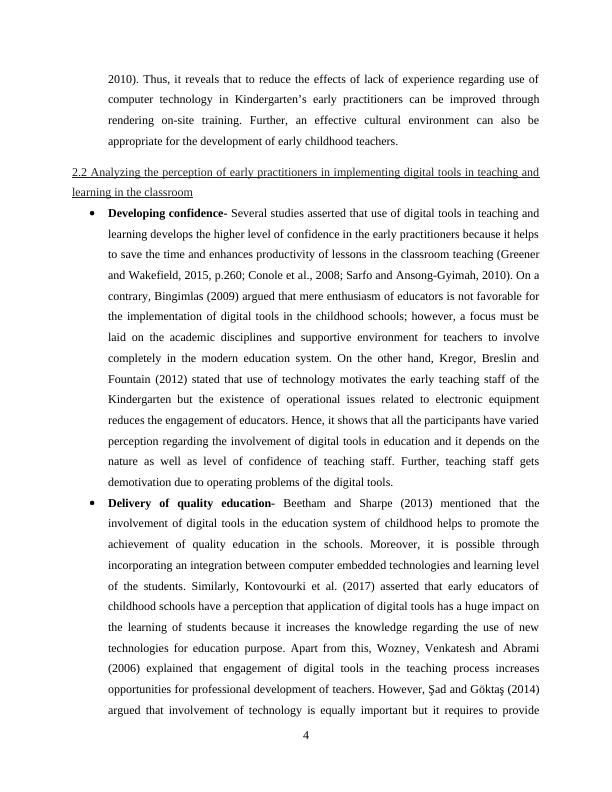
End of preview
Want to access all the pages? Upload your documents or become a member.
Related Documents
Teaching English With Technologylg...
|14
|6732
|34
The Impact of Virtual Learning Environment on Educational Institutions in the UKlg...
|20
|2570
|441
Role of WordPress Social Media Tool in Educationlg...
|16
|4788
|138
The Potential of Mobile Technologies Assignmentlg...
|7
|1854
|232
Media Literacy and Integration of Digital Media in the Classroom: A Meta Analysislg...
|18
|5686
|202
Impact of ICT on International Education for the 21st Centurylg...
|12
|2949
|453
